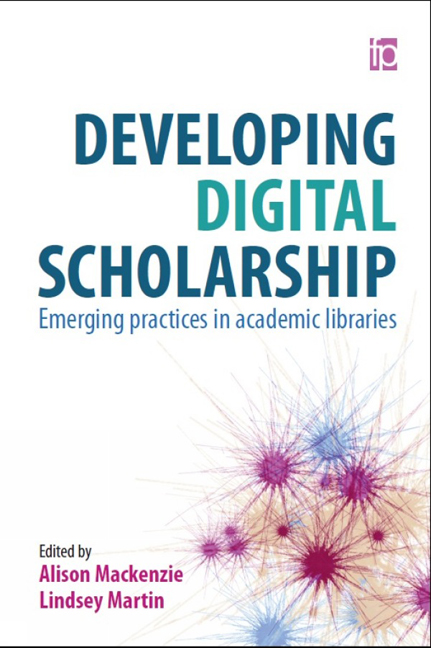Book contents
- Frontmatter
- Contents
- List of figures, tables and case studies
- Editors and contributors
- Introduction
- PART 1 A review of the landscape
- PART 2 The agile librarian
- PART 3 Digital spaces and services
- 6 Digital scholarship centres: converging space and expertise
- 7 Building scalable and sustainable services for researchers
- PART 4 Communications and social networking
- Index
6 - Digital scholarship centres: converging space and expertise
from PART 3 - Digital spaces and services
Published online by Cambridge University Press: 08 June 2018
- Frontmatter
- Contents
- List of figures, tables and case studies
- Editors and contributors
- Introduction
- PART 1 A review of the landscape
- PART 2 The agile librarian
- PART 3 Digital spaces and services
- 6 Digital scholarship centres: converging space and expertise
- 7 Building scalable and sustainable services for researchers
- PART 4 Communications and social networking
- Index
Summary
Introduction
Within the USA, the emerging currency of ‘digital scholarship’ within the academy can be demonstrated through various metrics. With support from the Andrew Mellon Foundation, Bucknell University in Pennsylvania offers an annual academic conference solely devoted to topics in digital scholarship. The conference held in 2015 attracted over 150 attendees from across the USA (Bucknell University, 2015). Many professional organizations now provide guidelines for evaluating academic work in specific disciplinary fields of digital scholarship for the purposes of hiring, promotion and tenure (see, for example, the guidelines of the Modern Language Association, 2012). Academic job advertisements seeking digital scholarship knowledge have increased drastically in the past decade; in the field of history alone there was a tenfold increase from 2003–4 (three postings) to 2012 (34 postings) with at least some mention of digital scholarship. Of the academic positions in history (tenure-track, academic administration, or nontenure faculty) advertised in fall 2013, 5 mentioned ‘digital’ in the title and an additional 11 required or preferred it. These prodigiously growing numbers in the above categories do not begin to reflect the broader opportunities for recent graduates with specialized digital scholarship skills outside of the traditional academy.
At many institutions, the university library fills the role of training and supporting individual researchers and students with an interest in digital scholarship. While teaching and research faculty are eager for their students to apply technology-based methodologies to research questions, they themselves are often unable or unwilling to devote class time to the acquisition of such skills. In many academic environments, therefore, including large research universities and small liberal arts colleges, the university library has increased its support for teaching and learning in new technology areas. In a workshop that brought together members of 24 digital scholarship centres from across the USA, Lippincott and Goldenberg-Hart (2014) identified common factors across institutions that led to the formation of a centre. These include a growing awareness by faculty or administration that students are graduating without the acquisition of contemporary skills sets; apprehension that peer institutions will eclipse the support or facilities offered at a particular university; and institutional assessment that affirmed the need or desire for services potentially offered by a digital scholarship centre.
- Type
- Chapter
- Information
- Developing Digital ScholarshipEmerging practices in academic libraries, pp. 105 - 120Publisher: FacetPrint publication year: 2016
- 2
- Cited by



